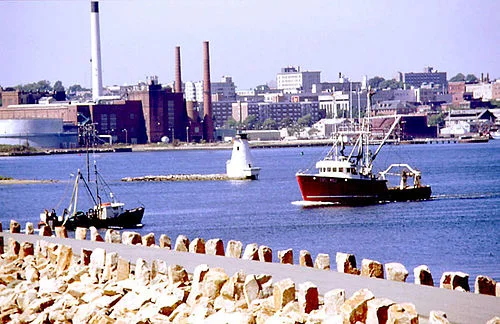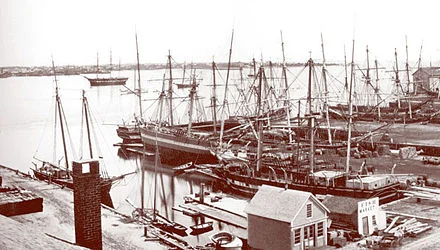
New Bedford as a green-energy Houston? thanks, Dunkin'; a big city running out of water
New Bedford Harbor.
From Robert Whitcomb's "Digital Diary,'' in GoLocal24.com:
Could southeastern New England become to offshore wind power what Houston has been for oil and natural gas? Maybe, but gradually. New Bedford’s Marine Commerce Port Terminal would probably be its center; it’s the first dock in the U.S. that’s strong enough to handle those very heavy offshore wind-turbine parts, and the Whaling City is all in about becoming a renewable-energy center.
Despite the Trump administration’s affiliation with the fossil-fuel industry, interest in offshore wind may be as intense as ever. The Boston Globe reported that an offshore-wind supply-chain conference held last year in Newton, Mass., attracted nearly 150 companies. And unions love this industry, which employs highly paid, highly skilled workers in the “blue-collar elite.’’
It’s too early to know what the impact of the Trump administration’s anti-green energy might be. U.S. solar-energy companies, for their part, have expressed concern that they’ll be hurt by the administration’s tough tariff policy on imports of solar panels from China.
Recently, survey ships for proposed projects south of Martha’s Vineyard have set forth from the Whaling City to study seabed conditions and plan transmission routes. Indeed, all the current developers for Massachusetts’ first wind projects have agreed to deploy from New Bedford. (Wouldn’t it be nice if Quonset could get some of that business?)
Another very promising port for offshore wind-turbine operations would be the recently decommissioned Brayton Point coal-fired plant, in Somerset.
New Bedford, Fall River, Quonset, Brayton Point and other places in southeastern New England could also become sites for other new renewable-energy projects that might develop, such as tidal and wave power. Meanwhile, the Trump administration would like to allow oil and gas drilling off New England near famous fishing areas….
New Bedford was an energy capital in the 19th Century because of the whale oil used for lighting; it was considered “clean’’ energy for the time. It was said to burn brightly and cleanly.
New Bedford Harbor in the late 19th Century, as the whaling boom disappeared.
xxx
Thank you, Canton, Mass.-based Dunkin’ Donuts, for deciding to phase out your polluting and nonrecylable foam cups by 2020. I hope that other fast-food operators do the same thing. These cups leave a mess: They last in the environment for many years. And the chemicals used to make them are dangerous. The main ingredient, styrene, may cause cancer in humans.
xxx
Cape Town, South Africa, is expected to run out of water in May, as extended drought, population growth and insatiable agricultural use drain aquifers. Some have linked the drought to man-made climate change.
The crisis in Cape Town recalls the sort of crisis that other basically dry places, such as Southern California, may soon face. Note that that drought continues to worsen across much of the West and South. But many places will eventually need detailed long-term and emergency measures to address climate change. In New England the biggest climate challenge will be coastal flooding; Boston had a foretaste of that last month during a big Northeaster.
New England’s, er, vigorous climate poses challenges but at least we have lots of fresh water – even more valuable than, say, oil.

